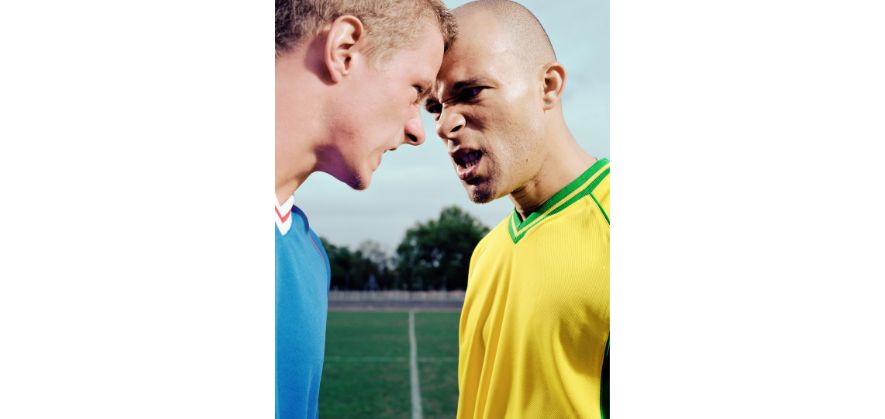Football has been home to many traditions that have been part of the game for several decades.
When it comes to competitions that culminate with cup finals, a winner and a loser is always determined.
This is because by the action that takes place on the pitch determines the end result, whether that happens in normal time, extra time or through a penalty shootout.
And when the outcome is made clear, things don’t end there.
The spectacle is usually extended by a short medal ceremony and trophy presentation, where the winners of the competition are awarded for their on-field success, whilst the players on the losing side pick up medals for being the runners up in recognition of their effort.
But one thing that tends to happen during this formality is players almost immediately choosing to take their medals off of their necks straight after being presented the accolade.
So, why do footballers remove their medals almost immediately after receiving them?
Well, read on to find out the answer!
Players from the losing team generally don’t wear their medals and remove them right after to follow standard practice – which involves accepting the medals and the overarching defeat with good grace and subsequently taking them off.
More so, losing as a player can hurt and the competitive nature ingrained in these athletes steers them towards taking off of their chests the medals which signify the loss that they just experienced and serve as a reminder that they were painfully defeated.
It’s actually not that complicated.
Read on to get the full picture.
Reasons why footballers remove their medals after a final
The answer to the question that the article topic raises is pretty much two-fold.
Here’s how…
1. Standard practice

Football has certain traditions and informal practices that have been in force for many years.
You only have to look at a couple of things like, for example, why teams exchange banners prior to kick off to see the part that these unspoken habits play in the modern game.
In a cup final, each player representing the losing team is given a medal as recognition for their effort despite the fact that they fell short as a collective.
Now it’s normal, and has been for a while, to see such players taking their medals off right after one of the tournament officials gifts them with the piece of silverware.
Some people even say that this action is good for the spectacle because it signals an acceptance that the losing team did indeed lose fairly.
And in addition to that, it can be argued that this practice of immediately removing medals symbolizes the fact that there was only one worthy winner and as a mark of respect players take off their medals to allow members of the winning team to bask in the spotlight that they rightfully deserve.
2. Competitive behavior

Naturally, football players are some of the most competitive athletes that you’ll come across.
For example…
Here’s a quick account from a former football professional who talks about how Cristiano Ronaldo was so upset simply because he lost a casual game of table tennis:
“He’s a machine. They were playing table tennis and Rio (Ferdinand) beat him and we were all screaming. Ronaldo was so upset. Then he sent his cousin to buy a table tennis. He trained for two weeks and came back and beat Rio in front of everyone. That’s Cristiano Ronaldo.”
Source – Sport Bible
Being seen as a loser is not something that players performing at the highest levels of football want to be associated with.
So, removing their losers medals is a sort of coping mechanism that they use to rid themselves of the tangible reminder that they were defeated in competition.
What do football players do with the medals they receive?
If you’re on the winning team, you’d definitely want to remember your success at a later date.
And you’d also want to make sure that all of your friends and family know about your exploits!
Players who pick up winner’s medals tend to do a lot of different things with them, based on their own personal preferences.
This includes, but is not limited to:
- Storing them in a trophy cabinet;
- Keeping them in a dedicated football museum (something Cristiano Ronaldo does with his Museu CR7 museum in Funchal – Portugal)
- Hanging them up on walls within the house; or
- Giving them away to charity
Which players recently took their medals off after a final?
Back in 2021, England faced off against Italy in the final of the 2020 European Championships.
In a hard-fought contest, Italy emerged victorious and the England players were left devastated.
Their nation had waited a very long time to get to a final in an international competition, so it was difficult for the England players to take as they fell at the final hurdle.
Footballers like Harry Kane, Phil Foden, Mason Mount and Jack Grealish could be seen taking off their medals immediately after receiving them from UEFA president Aleksander Čeferin.
They clearly weren’t happy with the outcome and wasted no time removing their medals as they walked off of the podium.
Here’s a short clip which gives greater context to the situation:
It was actually quite interesting to hear Harry Kane personally touch on why the England players removed their medals, as he cited the outcome as a missed opportunity for the team to pick up silverware, particularly after a 55-year wait to get to a final.
After all, England had initially taken the lead in the match through a Luke Shaw opener, so the players were certainly of the opinion that they let the game slip away from them.
Should football players be criticized for removing their losers’ medals?
One thing you have to remember is that football players aren’t superhuman.
They have feelings and experience emotions in the same way that any other person would.
After working hard on the football field, it’s only natural for them to be disappointed with themselves for failing to win a competition and lift the trophy
What’s more is that players aren’t only taking part in the sport for themselves.
They have families to support and fans to make proud, so the burden of expectation is generally very high.
When that’s the case, losing in a final can have a significant psychological impact which sometimes manifests itself in the way in which they react to receiving medals during the trophy presentation.
Ultimately, it’s reasonable to say that players don’t deserve the criticism and negative press coverage that gets thrown their way after a defeat in a final.
Despite the fact that some people argue that the actions of such players are unsportsmanlike and disrespectful, you really have to put yourself in their shoes in order to understand the full magnitude of what they’re going through and why they behave the way they do after losing.
Closing thoughts
And that’s a wrap!
This article has comprehensively covered our thoughts on why footballers take off their medals during the final ceremony, with particular reference to the losing side.
If you’ve enjoyed this article, then you should definitely check out some other interesting posts on the blog, like:
- Why footballers lie behind the wall during free kicks;
- How loans work in soccer;
- What footballers like to drink during games;
- Why soccer balls are black and white in color; and
- What pickup soccer is
If you enjoy the content that I create and would like to buy me a coffee, then I’d really appreciate it!
Any money that I earn through this donation will be re-invested into more content for this website.
Additionally, by sending in a donation you’ll also receive a copy of my recently released 190+ page eBook on Soccer Ball Care, as well as be subscribed to our mailing list where you’ll be regularly informed on the latest developments concerning the Soccer Whizz blog.
- Future Icons: Europe’s Emerging Midfield Maestros Set for Glory - December 4, 2023
- Kickstarting a Revolution: How Soccer Transformed the United States Over the Last Four Years - October 7, 2023
- 4-1-4-1 Soccer Formation [Analysis] - September 23, 2023

